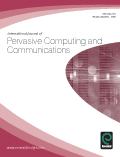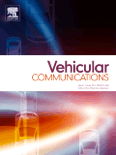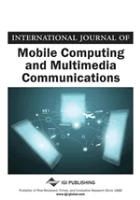
International Journal of Pervasive Computing and Communications
Scope & Guideline
Empowering researchers to redefine communication.
Introduction
Aims and Scopes
- Pervasive Computing Applications:
Research in this area encompasses the development and deployment of applications that utilize pervasive computing technologies, including health monitoring systems, smart environments, and intelligent transportation solutions. - Cloud and Edge Computing:
The journal features studies on cloud and edge computing paradigms, focusing on task scheduling, resource allocation, and energy efficiency to improve the performance of distributed computing systems. - Security and Privacy in Computing:
A significant emphasis is placed on security protocols, intrusion detection systems, and privacy preservation techniques, particularly in the context of IoT and cloud environments. - Machine Learning and Data Analytics:
The journal promotes research on machine learning and data analytics techniques applied to various fields, including health informatics, smart cities, and vehicular networks. - Networking Protocols and Communication Technologies:
Investigations into innovative networking protocols, communication systems, and methodologies that enhance the functionality and reliability of pervasive computing environments are a core focus. - Energy Efficiency and Sustainability:
Research dedicated to energy-efficient algorithms and sustainable practices in pervasive computing and communications, aiming to reduce the environmental impact of technology.
Trending and Emerging
- Federated Learning:
Federated learning is increasingly being explored as a means to enhance data privacy and security in distributed systems, particularly in IoT and edge computing environments. - Energy-Aware Computing:
There is a growing trend towards energy-efficient computing solutions, with research focusing on algorithms and architectures that minimize energy consumption while maintaining performance. - Integration of AI and IoT:
The convergence of artificial intelligence (AI) with Internet of Things (IoT) technologies is becoming a prominent theme, with applications in smart health, smart cities, and autonomous systems. - Context-Aware Computing:
Research on context-aware systems that adapt to user behavior and environmental conditions is emerging, enhancing user experience and system efficiency. - Health Informatics:
The journal is seeing an increase in publications related to health informatics, particularly leveraging IoT and machine learning for disease detection and monitoring. - Security in Autonomous Systems:
As autonomous systems become more prevalent, there is a rising interest in developing robust security measures to protect these systems from emerging threats.
Declining or Waning
- Traditional Networking Protocols:
Research on older networking protocols that do not incorporate modern advancements or considerations for IoT and edge computing is becoming less frequent, as newer methodologies gain traction. - Static Security Measures:
The focus on static, non-adaptive security measures in pervasive computing environments is waning, with a shift towards more dynamic and adaptive security frameworks that can respond to evolving threats. - Basic Data Collection Techniques:
Studies that concentrate solely on basic data collection without integrating advanced analytics or machine learning approaches are seeing a decline, as more complex data processing methods are preferred.
Similar Journals

Future Generation Computer Systems-The International Journal of eScience
Transforming Ideas into eScience ExcellenceFuture Generation Computer Systems - The International Journal of eScience, published by ELSEVIER, stands at the forefront of the fields of computer networks, hardware architecture, and software engineering, as evidenced by its impressive Q1 quartile rankings in 2023 across these categories. With an ISSN of 0167-739X and an E-ISSN of 1872-7115, this esteemed journal has been a significant contributor to the body of knowledge in the computer science domain since its inception in 1984, continuing to shape the landscape of eScience through cutting-edge research and innovative practices. Featuring a broad scope that embraces various interrelated disciplines, Future Generation Computer Systems is particularly recognized for its high impact factor and prestigious Scopus rankings, where it ranks in the top echelons—8th in Computer Networks and Communications, 5th in Hardware and Architecture, and 17th in Software—placing it in the 95th to 98th percentiles of their respective fields. Although currently not open access, the journal provides invaluable insights and advancements aimed at researchers, professionals, and students alike, driving the evolution of technology and its applications in an increasingly digital world.

Cluster Computing-The Journal of Networks Software Tools and Applications
Catalyzing Progress in Software Tools and ApplicationsCluster Computing - The Journal of Networks Software Tools and Applications, published by Springer, is a premier academic journal catering to the vibrant fields of computer networks and software technologies. With an impressive impact factor and recognized as a Q1 journal in both Computer Networks and Communications and Software categories for 2023, it ranks within the top echelons of its field, boasting a Scopus rank of #50 out of 395 and #59 out of 407 respectively, highlighting its influence and reach. The journal, which has been in continuous publication since 2005, serves as a vital platform for groundbreaking research, offering insightful articles and tools that drive innovation in network computing. Researchers, professionals, and students are invited to contribute to and benefit from the dynamic discourse presented in this journal, which is pivotal for advancing knowledge and enhancing practical applications in a rapidly evolving technological landscape.

Vehicular Communications
Unleashing the Potential of Vehicle Communication SystemsVehicular Communications is a leading academic journal dedicated to the field of automotive engineering, communication, and electrical and electronic engineering, published by Elsevier. With an impressive impact factor and classification in the Q1 quartile for 2023 across three critical categories, this journal ranks among the top scholarly platforms, especially in automotive engineering and communication disciplines. With a focus on the latest innovations and technologies pertaining to vehicular communication systems, it provides a vital forum for the dissemination of high-quality research, bridging theoretical knowledge and practical applications. Researchers, professionals, and students are encouraged to contribute to this dynamic publication, which not only highlights cutting-edge advancements but also promotes interdisciplinary collaboration in the rapidly evolving landscape of connected and autonomous vehicles. As the field continues to grow, Vehicular Communications aims to facilitate knowledge exchange and inspire future research directions through its comprehensive and accessible content.

International Journal of Mobile Computing and Multimedia Communications
Bridging Technology and Connectivity for TomorrowThe International Journal of Mobile Computing and Multimedia Communications, published by IGI Global, stands at the intersection of technology and connectivity, addressing the critical advancements in mobile computing and multimedia communications. With an ISSN of 1937-9412, this journal provides a platform for the dissemination of innovative research findings and insights, fostering collaboration and communication among researchers, professionals, and students within the field. Although currently indexed in the Q4 quartile for 2023 in Computer Networks and Communications, its rich archive of articles from 2009 to 2014 and 2016 to 2024 reflects the journal's ongoing commitment to exploring emerging trends, technologies, and methodologies that shape the future of mobile computing. While it is not an open-access journal, the high-quality research published here is crucial for advancing academic discourse and practical applications in an increasingly digital world. By encouraging submissions across a wide range of topics, International Journal of Mobile Computing and Multimedia Communications continues to enhance its reputation as a pivotal resource for scholars and industry experts alike.

WIRELESS NETWORKS
Shaping Tomorrow's Wireless Solutions TodayWIRELESS NETWORKS is a prestigious journal published by Springer, focusing on cutting-edge research in the domains of wireless communication, computer networks, and information systems. Established in 1995 and set to converge its influential contributions until 2024, this journal has rapidly ascended to a Q2 category ranking in the fields of Computer Networks and Communications, Electrical and Electronic Engineering, and Information Systems, reflecting its significant role in advancing knowledge and innovation—ranked 75th, 151st, and 84th respectively in their fields by Scopus. Researchers and professionals alike value its contribution to the discourse on wireless technologies, making it a vital resource for professionals and students eager to stay abreast of the latest trends and findings. Although it does not offer open access, the insights gleaned from its articles are invaluable for tackling the challenges of modern communications and ensuring the efficient use of wireless networks.

International Journal of Grid and Utility Computing
Bridging Theory and Practice in Computing TechnologiesInternational Journal of Grid and Utility Computing is a pioneering publication dedicated to advancing research in the domains of grid computing, utility computing, and their applications across various sectors. Initiated in 2005 and continuing through 2024, the journal is published by INDERSCIENCE ENTERPRISES LTD, a respected publisher known for its commitment to facilitating scholarly communication. With an ISSN of 1741-847X and an E-ISSN of 1741-8488, this journal, based in the United Kingdom, serves a global audience of researchers, professionals, and students. Although classified in the Q4 category across Applied Mathematics, Computer Science Applications, and Management Information Systems, the journal aims to bridge theoretical research with practical implementation, fostering interdisciplinary collaborations. Researchers looking for a platform to disseminate their work on grid technology and its utility in modern computing environments will find this journal an invaluable resource. The focus on innovative computing methodologies places it at the forefront of emerging trends and technology applications, despite the need for increased visibility in competitive metrics like Scopus rankings.

Journal of Cloud Computing-Advances Systems and Applications
Harnessing the Potential of Cloud for TomorrowThe Journal of Cloud Computing - Advances Systems and Applications, published by Springer, serves as a premier platform for disseminating cutting-edge research in the fields of cloud computing, computer networks, and software technologies. With an impressive impact factor and ranked in the top quartile for Computer Networks and Communications and Software categories in 2023, this open access journal has gained significant recognition within the academic community since its establishment in 2012. The journal not only provides valuable insights into innovative applications and advancements in cloud technologies but also supports collaboration among scholars, practitioners, and industry leaders. Operating from the vibrant hub of New York City, it boasts a robust international readership, ensuring that the latest findings reach a diverse audience. Authors and researchers are encouraged to engage with this vital resource, which is dedicated to exploring the transformative potential of cloud computing across multiple disciplines.

International Journal of Networked and Distributed Computing
Elevating Knowledge in Distributed ComputingWelcome to the International Journal of Networked and Distributed Computing, published by SpringerNature, a premier outlet for cutting-edge research in the realms of computer networks and distributed computing systems. Established as an Open Access journal since 2013 and based in the Netherlands, this publication strives to disseminate high-quality, peer-reviewed studies that address the complexities of contemporary computing challenges. With an impact factor that reflects its growing influence—positioned in the Q3 category for both Computer Networks and Communications and Computer Science Applications—this journal serves as a pivotal resource for scholars and practitioners aiming to advance knowledge and innovation in this rapidly evolving field. The journal encompasses diverse topics, from network protocols to distributed algorithms, ensuring that researchers, professionals, and students can find relevant insights and methodologies to inform their work. Join us in exploring the depths of networked and distributed computing, contributing to a collaborative academic environment that shapes the future of technology.

Journal of Grid Computing
Empowering Innovation in Grid TechnologiesThe Journal of Grid Computing, published by Springer, stands as a pivotal resource in the dynamic field of computer science, particularly within the realms of Computer Networks and Communications, Hardware and Architecture, Information Systems, and Software. With an impressive Q1 ranking across these categories in 2023, the journal exemplifies excellence and rigor, catering to a diverse readership from researchers to industry professionals. Established in 2003, this esteemed journal is anchored in the Netherlands and releases cutting-edge research that reflects trends and advancements in grid computing technologies. Researchers can gain insights through its vast contributions, while institutions benefit from its prestigious standing within the SCOPUS framework, boasting high percentile ranks in multiple computer science categories. Though not open access, the journal provides unparalleled access options for institutional subscribers, solidifying its importance as a gateway to innovative discoveries in high-performance distributed computing.

GetMobile-Mobile Computing & Communications Review
Navigating the Evolving Landscape of Mobile ComputingGetMobile-Mobile Computing & Communications Review, published by the Association for Computing Machinery (ACM), is a leading journal dedicated to the evolving field of mobile computing and communication technologies. With an ISSN of 2375-0529 and an E-ISSN of 2375-0537, this publication serves as a vital resource for researchers, professionals, and students, providing insights into the latest advancements, trends, and challenges in mobile technology. The journal covers a comprehensive range of topics, including but not limited to mobile networks, communications protocols, mobile applications, and edge computing, making it invaluable for those in academia and industry alike. Although specific metrics such as impact factor and H-index are currently unavailable, GetMobile is recognized for fostering innovative research and promoting knowledge exchange in mobile and computational communications. As the field continues to grow, this journal remains pivotal for disseminating impactful studies and practical applications that drive the future of mobile technology.